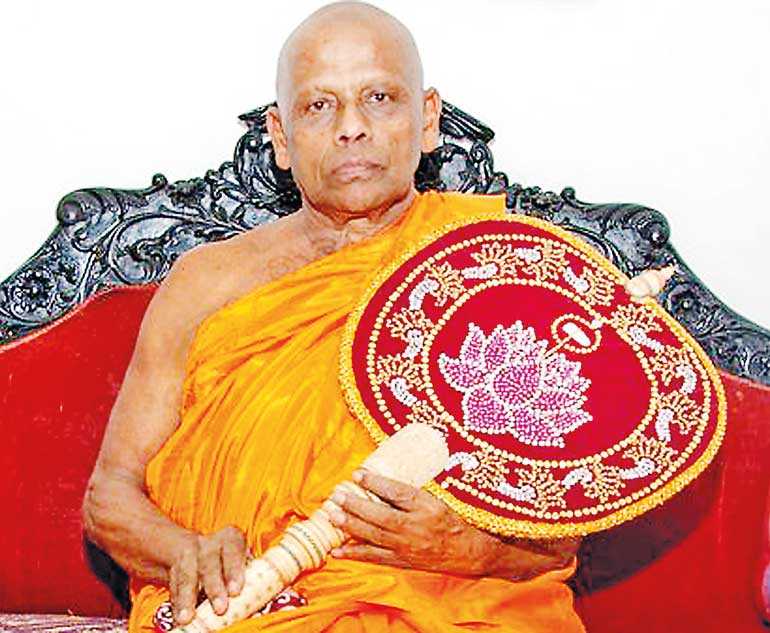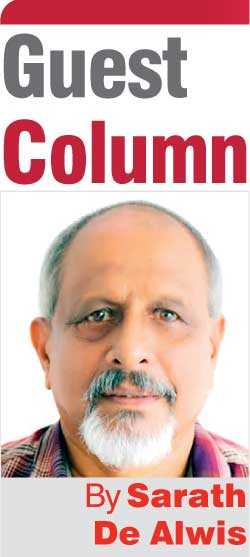Friday Feb 20, 2026
Friday Feb 20, 2026
Wednesday, 26 June 2019 00:43 - - {{hitsCtrl.values.hits}}

The most venerable Warakagoda Sri Gnanarathana Thero Mahanayake of the Asgiriya chapter has announced that his recent remarks, have been misconstrued and distorted.
The authenticity of recorded information in cyber space is an inconvenient truth of the age we live in. For those curious the original ‘Anusasana’ and the subsequent clarification are both available in the internet.
We must take refuge in the Dhammapada. As rain makes its way in to a badly roofed house, so passion makes its way in to an unreflecting mind. As rain does not make its way in to a well roofed house, so passion does not make its way in to a reflecting mind.
With a Presidential Election round the corner, these are times for deep reflection.
Bring to this country once again the blessed name
Which made the land of thy birth sacred to all distant lands! Let thy great awakening under the Bodhi-tree be fulfilled. Sweeping away the veil of unreason and let, at the end of an oblivious night,
Freshly blossom out in India thy remembrance!
All creatures are crying for a new birth of thine.
Oh, thou of boundless life,
save them, rouse thine eternal voice of hope.
Let love’s lotus with its inexhaustible treasure of honey
open its petals in thy light.
O Serene, O Free
in thine immeasurable mercy and goodness
wipe away all dark stains from the heart of this earth.
In 1931, Rabindranath Tagore wrote these verses capturing the sublime quintessence of the great awakening of the Buddha to mark the consecration of the new Mulagandha Kuti Viharaya at Saranath where the Buddha preached his first sermon. Tagore was not merely celebrating the message of the Buddha. He was also crying for a new birth of the Buddha as the eternal voice of hope.
We have again reached such a point when we desperately need the Buddha to guide us.
Tagore’s poetry capturing the quintessence of the Buddha – “O Serene, O Free, in thine immeasurable mercy and goodness, wipe away all dark stains from the heart of this earth” – is an  eloquent rebuke of the stain produced by the ecclesiastical exercise on the feasibility of stoning people.
eloquent rebuke of the stain produced by the ecclesiastical exercise on the feasibility of stoning people.
In 2014, Amartya Sen, the Nobel Laureate in economics, published an essay on the relevance of Buddhism in the 21st Century. He reminds us that Rabindranath Tagore once remarked that he was extremely sad that he was not alive when Gautama Buddha was still around.
“Tagore very much wished he could have had conversations with Buddha. I share that sentiment, but, like Rabindranath, I am also immensely grateful that, even now, we can enjoy – and learn from – the ideas and arguments that Buddha gave us twenty-five hundred years ago. Our world may be very different from what Buddha faced in the sixth century BC, but we can still benefit greatly from the reasoned approach to ethics, politics, and social relations that Gautama Buddha brought to the world of human understanding.”
I have cited Rabindranath Tagore and Professor Amartya Sen for a specific reason. Both offer living proof that the oriental mind is a fertile field for knowledge and reason. That it was so, long before what we now know as the European Reformation and Enlightenment.
The point is significant. Individual human rights is not a western imperialist conspiracy but an implicit component of authentic Buddhist teaching. It is a point that should be driven home with great urgency.
In the context of Gotabaya Rajapaksa running for the presidency, it is an existential imperative for us who cherish freedom. That the Sinhala language has no precise equivalents for liberty and freedom is a sad commentary of our present dilemma.
A Gotabaya Rajapaksa candidacy should be welcomed. His quest for a majority of the majority presents us with a clear choice: Universalist humanism or insular tribalism.
Even a passing reference to a barbaric tribal practice should stir the conscience of anyone who claims an iota of familiarity with what the Buddha taught. Cocooned in privilege and power, the institutional Buddhist monastic orders are distanced from the objective of being beacons of humility, kindness and compassion.
We are still riddled with the suffering of humanity. Its causes persist today just as they did in the time of the master.
We have arrived at a fork. Where do we go? Should we remain trapped in tribal prejudice or embrace universal knowledge? Tribalism is the comfortable cosy pattern that looks inward to ethnicity and religious conformity. The people who define themselves in such terms always perceive themselves in opposition to other groups. They are confined to values, beliefs and orientations of their tradition. That was the essence of the controversy.
People who aspire towards a universal community regard themselves as part of a larger world that transcends the regional or tribal framework they were born in to.
While the universalists see themselves through a universal framework, they also retain their individuality. While subscribing to universal norms, they remain firmly grounded in their sense of individual identity. The stark contrast between the tribal and universal world view is demonstrated in their attitude towards authority.
For the tribal group, authority is something that comes from the tribal chief. The authority is either attached to a lineage such as the family that won a humanitarian war or more abstractly, from the tradition or dogma of the tribal unit.
For universalists such as this writer, authority is defined in terms of reality that needs to be shaped, altered or accepted. The universalists insist on their right to know and interpret reality individually, and not as received, collected wisdom offered by self-styled experts and professionals of the ‘Viyathmaga’ type.
The internet and evolving digital technology compels us to see ourselves as a part of the universe. Our monastic orders notwithstanding. Like it or not we are only a small part of the universal puzzle. The Buddha saw it first.
The Mahanayake Thero has not disclaimed his expressed opinion on who our next president should be. Come November, we will come face to face with liberty. Do we say hello or bye-bye to liberty?